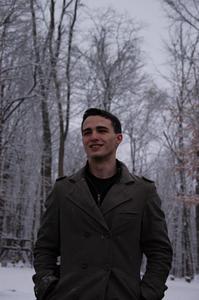Splash Biography
RYAN MALPASS, MCDB
|
Major: MCDB College/Employer: Yale Year of Graduation: 2017 |

|
Brief Biographical Sketch:
Hello! My name is Ryan, I'm from New York. During high school I spent a summer at Rockefeller University researching the physical changes in the brain that result from amphetamine addiction, and interned at Regeneron Pharmaceuticals researching the neural differentiation of stem cells. At Yale I have been involved with the Redmond Lab, a lab focused on treatments for neurodegenerative diseases using stem cell therapies. I've interned this last summer at Regeneron, making CRISPR knockout cell lines to study rare peroxisome disorders. Ask me anything! Past Classes(Clicking a class title will bring you to the course's section of the corresponding course catalog)C2459: Experimental Design in Sprout Spring 17 (Feb. 11 - 25, 2017)
So you want to be one of the greatest scientists of the modern era? Then join us as we analyze some of the most amazing experiments in history, learn about some of the most ingenious scientific minds, and run our very own experiments. Each week will feature new experiments as groups work together and sometimes even compete to get the best results. Each week will also feature new experiments, scientists, and ideas that were revolutionary in their time.
S2306: Nobel Experiments in Cell Biology in Splash Fall 16 (Nov. 05, 2016)
If you're interested in the experiments that shaped our present understanding of biology and the cell, this class is for you! Through a whirlwind tour of Nobel winning experiments, this class will teach you the approaches, methods, and interpretation of results from a few monumental papers in the history of cell biological research. This class will include both discussion and brief summaries of the experiments conducted. Prepare for a fast-paced, challenging, and fun class.
C2125: Nutrition, Public Health, and Cancer in Sprout Fall 16 (Oct. 01 - 15, 2016)
Have you every wondered about the science behind food? If so, this class will provide you with a scientific basis for understanding the role of nutrition in the cause, prevention, and management of chronic diseases. A wide range of topics are covered, such as micronutrients, macronutrients, foods, food groups, dietary patterns, and energy balance. This course also teaches students how nutrition/diet is measured for research and public health surveillance, as well as the primary analysis methods used in the public health study of nutrition. Chronic diseases that may be addressed include cardiovascular diseases, osteoporosis, obesity, diabetes mellitus, and aging, though special emphasis is given to nutrition in relation to cancer. In addition to learning about public health and basic science research on nutrition and chronic disease, students will delve into how this evidence plays a role in nutrition-related legislation, food marketing, and federal nutrition policy (e.g. dietary guidelines, dietary supplement regulations, food labeling).
S1917: Microbiology in Splash Spring 16 (Apr. 02, 2016)
Bacteria were the first life forms to appear nearly 3.8 billion years ago, and today can be found in hot, acidic hydrothermal vents and Arctic lakes. Tiny cells without a nucleus or membrane-bound organelles, bacteria are the most thriving and abundant form of life on Earth. The human body harbors ten times the number of bacteria compared to cells, while bacteria have formed both symbiotic and parasitic relationships with plants and animals. Most bacteria in your body are neutral or beneficial, although many diseases are caused by pathogenic infection. Much of the biochemistry, protein structure and function in bacteria is well-defined, and important discoveries have been made using model systems such as E. Coli. Bacteria have been used in the beer and bread industries for thousands of years, and now biotechnology uses bacteria to manufacture proteins such as human insulin. Bacteria are amazing, efficient machines that occupy many diverse niches. Plus, some bacteria have unique functions such as bioluminescence (they glow in the dark!)
C1832: Organic Chemistry in Sprout Spring 16 (Feb. 13 - 27, 2016)
A survey of organic chemistry, including topics such as:
* Structure and bonding of organic molecules
* Intermolecular forces
* Periodic trends
* Charge and Lewis structures
* Resonance structures
* Hybridization and molecular orbitals
* Acidity and basicity
* Kinetics and thermodynamics
* Reaction mechanisms
* Stereochemistry and molecular geometry
* Nuclear magnetic resonance (NMR)
* Organic chemistry of life processes
3D molecular models will be used!
S1788: Darwin, Mendel, and the Origin of Life in Splash Fall 15 (Nov. 14, 2015)
This course will cover the development of life from simple prokaryotes to multicellular eukaryotes and all the branches of life, tracing back to the development of the first protocells likely created by hydrothermal vents. This class will cover the genome, Darwin, Mendel, and billions of years of evolutionary history.
C1698: Growing Organs in a Petri Dish in Sprout Fall 15 (Oct. 03 - 17, 2015)
This class will cover the history of stem cell technology, and related topics such as cloning, genetic engineering, public policy, and the media. The class will also turn to applications of stem cell technology in the present and future, including the promise of stem cells for treating and modeling diseases.
|
|
